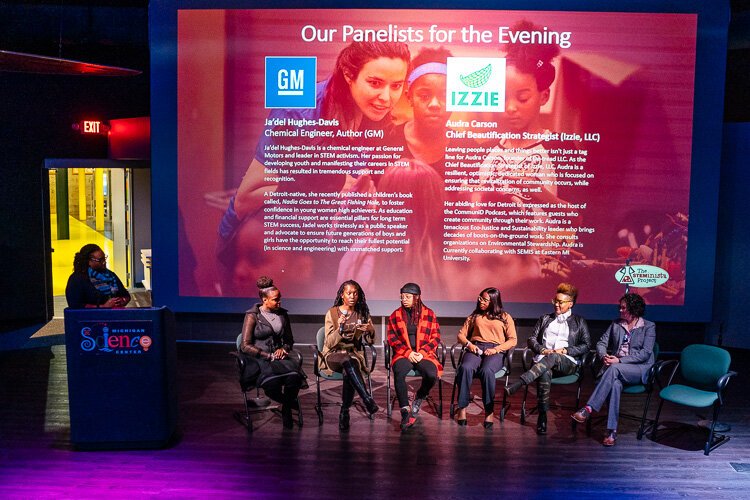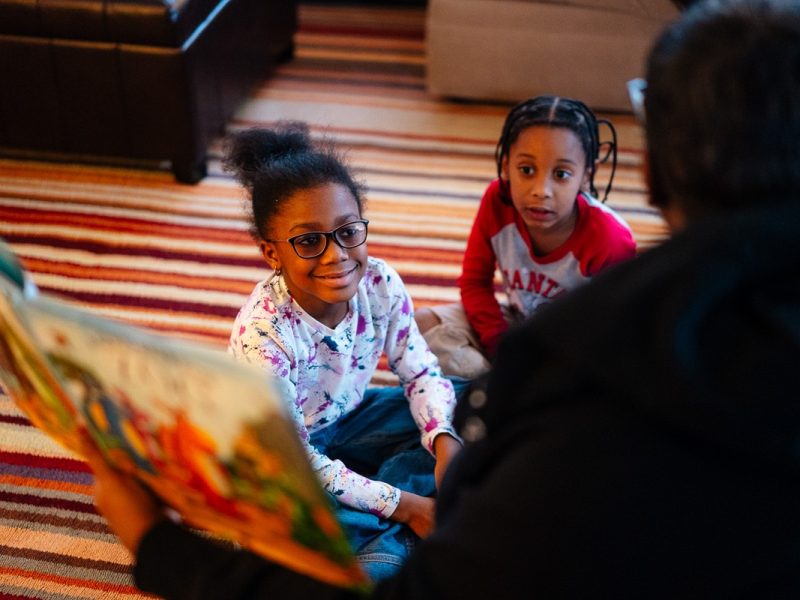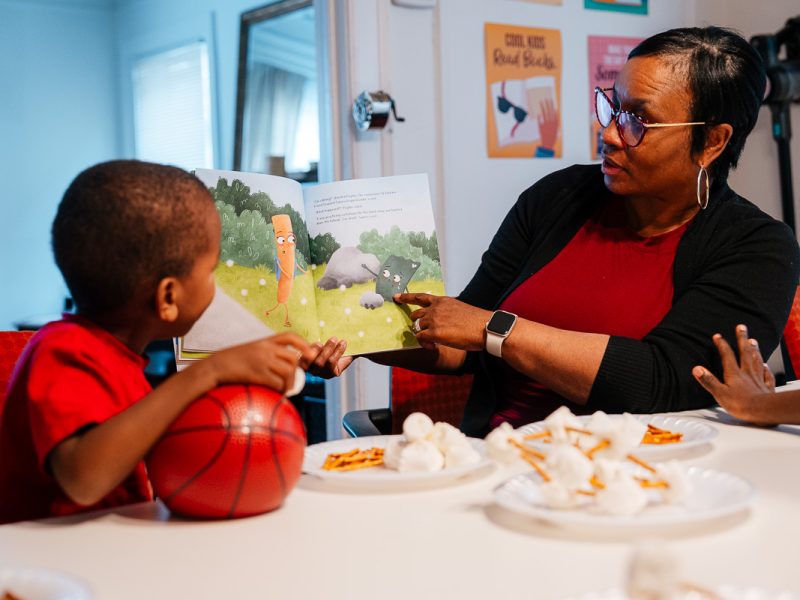Partner Partner Content Women in STEM propel the next generation at the Michigan Science Center
The Michigan Science Center hosted a panel discussion with six women in STEM fields on Jan. 30. They answered questions related to their personal experiences as women in STEM, strategies to become better mentors, and their vision for the future of girls in STEM fields.

Audra Carson, the chief beautification strategist for Izzie, an eco-driven janitorial service and sustainability consulting company in Detroit, faced a lot of barriers as a woman in STEM (Science, Technology, Engineering, Math).
“I’ve had to push through the things poured into me based on my generation,” Carson said. “It wasn’t on the table that we would be chemists or environmentalists or scientists, but now that framework is changing.”
Carson was among the featured panelists at “A Night with STEMinistas” discussion panel last Thursday at the Toyota Engineering 4D Theater located within MiSci. Moderated by Andrea Harp, the community partnership manager with the STEMinista Project, the panel featured six women working in STEM careers: Carson, Ja’del Hughes-Davis, Britney Epps, Deirdre Roberson, Alyssa Space, and Cassie Byrd. They spoke about personal experiences as women in STEM, strategies to become better mentors, and their vision for the future of girls in STEM fields.
While the panelists work in different parts of STEM, from chemistry to environmental entrepreneurship to computer science, they agreed that the most important thing women in STEM can do is mentor the next generation of girls.
Girls like 11-year-old Cayla Thomas. She likes to paint her nails, but the fumes trigger her asthma.
Instead of giving it up, she searched for a solution: an allergen-free polish that would be safe for even the most delicate nails. She pitched her idea at an entrepreneurship camp hosted by the Michigan Science Center (MiSci) and won. Now, with $500 in prize money, she plans to launch her company, PYOUR by Cayla Ann, this year.
“Just as we know Steve Jobs and Elon Musk, we should know Cayla Thomas,” said Roberson, a chemist and program manager for the STEMinista Project, a MiSci program for girls in grades 4-8 that offers STEM-related camps, meet-and-greets with women working at interesting STEM jobs and more.
Many women working in STEM face unconscious gender bias, so when girls can see themselves in those jobs, they know they can do it too, the panelists said.
“A lot of time, when I pitch my skin care company, people are surprised that I’m the chemist,” said Space, the founder and CEO of ForHerCosmetics, a vegan cosmetic brand now being mass-produced in Detroit. “For me, it’s showing up and being that representation — breaking that stigma, that a scientist can look just like me.”
Epps, a software engineer for StockX, a Detroit-based technology startup, agrees. “There’s definitely something important in seeing someone do something first. I’ve always enjoyed teaching kids, and I’ve always loved coding, but the two didn’t intersect until I saw the makeup of my team and the engineers around me.”
“When I work with kids they say, ‘Wow! You like sneakers and you’re an engineer?’ Seeing those things together for a kid can be life-changing,” she added.
Hughes-Davis, a chemical engineer at General Motors and author of the children’s book “Nadia Goes to the Great Fishing Hole,” a tale meant to inspire girls to explore science, said parents can play a role in inspiring their children, too.
“As a first-generation student, I realized I had tremendous power by showing up in the room,” said Hughes-Davis. “We dismiss the tremendous value there is in providing emotional support for our kids. Plant those seeds. Your voice is important. Give them that confidence.”
Roberson encouraged STEM mentors to take pride in their uniqueness and to showcase themselves to their mentees, as it makes their message even stronger.
“I’m showing up as my authentic self every day,” Roberson said. “They say ‘Deirdre is silly, Deirdre is into fashion,’ but I’m also a scientist, and it’s important for students to see themselves in that way,” she said. “At a STEMinista workshop, there was a black girl talking about her hair and she said, ‘Well, this is just my shrinkage!’ and we looked at her like, ‘We know!’”
“It’s about being able to connect on those levels with the girls […] We understand you, and this is a comfortable space to be who you are—all of who you are,” she added.
Harp asked the panelists what they envision people will be saying about girls in STEM a year from today.
“I want Detroit and Southeast Michigan to be a great place for girls,” said Byrd, the chief learning officer at MiSci and a molecular biologist.
“I want a message to get outside of Detroit, outside of Michigan, so that people are like, ‘Man, something is happening in Detroit! All of a sudden, we have all these girls coming out of Detroit, inventing stuff, winning competitions, becoming the women asking the questions in research,’” Byrd said.
“My dream is for girls to take our places,” Epps said. “We’re up here, we’re that representation. As we start building these pipelines, that’s how we’ll know those pipelines really work.”



